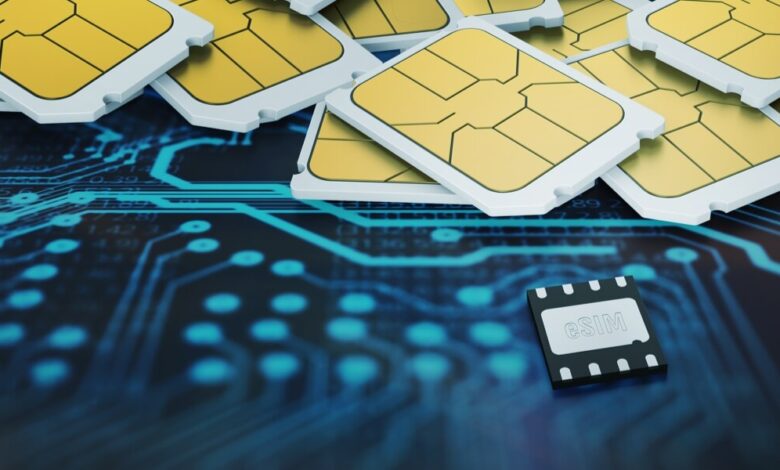A Comprehensive Guide to Managing IoT Sims in Your Business with the Latest Tools and Platforms

In a world where the Internet of Things (IoT) is revolutionising industries and transforming business operations, managing IoT sims has become more crucial than ever. With the latest tools and platforms available, businesses can streamline their processes, improve efficiency, and maximise the potential of their IoT devices. In this comprehensive guide, we will explore everything you need to know about managing IoT sims in your business and how to leverage these cutting-edge solutions for success. Let’s dive in!
Introduction to IoT Sims and their Importance in Business
IoT (Internet of Things) Sims, also known as M2M (Machine-to-Machine) Sims, are specialised SIM cards designed specifically for use in connected devices such as sensors, trackers, and other Internet-enabled devices. These Sims enable these devices to communicate with each other and the internet by providing a unique identifier for each device.
In today’s digital age, businesses are increasingly relying on IoT technology to improve their operations and gain a competitive edge. From tracking inventory and monitoring equipment performance to improving customer experiences through smart devices, IoT has become an essential tool for businesses across various industries.
The importance of IoT Sims in business cannot be understated. Here are some key reasons why they have become critical tools for managing IoT devices:
- Reliable Connectivity: Traditional mobile network providers may not always offer reliable connectivity in remote or rugged areas where many IoT devices operate. With dedicated networks and coverage optimised for M2M communication, IoT Sims ensure consistent connectivity regardless of location or environmental conditions.
- Cost-Effective Solution: Unlike traditional SIM cards that require monthly subscription plans or high pay-per-use charges, most IoT Sim providers offer flexible pricing options tailored to the specific needs of businesses. This cost-effective approach allows companies to manage their budget efficiently without sacrificing essential connectivity services.
- Scalability: As businesses grow, their need for more connected devices also increases. With traditional SIM cards, adding new connections can be cumbersome and time-consuming. However, with the scalability offered by IoT sims and platforms like Aeris Fusion Core™ , companies can easily add thousands of new connections without any hassle.
- Advanced Security Features: With the rise of cyber threats targeting connected devices, security has become a top concern for businesses utilising IoT technology. Many reputable M2M providers offer advanced security features such as encrypted data transmission and robust authentication protocols to protect sensitive business information from potential breaches.
5.The Power of Real-Time Data: One of the most significant advantages of IoT technology is the ability to collect and analyse real-time data. With IoT Sims, businesses can access this valuable information from their connected devices in a timely and efficient manner, enabling them to make data-driven decisions for better performance and increased productivity.
IoT Sims are crucial tools for businesses looking to harness the power of IoT technology. By providing reliable connectivity, cost-effective solutions, scalability, advanced security features, and access to real-time data, these SIM cards are essential components in managing IoT devices effectively. In the following sections of this guide, we will explore some of the latest tools and platforms that can help your business manage its IoT Sims efficiently.
Types of IoT Sims and their Features
IoT (Internet of Things) Sims, also known as M2M (machine-to-machine) sims, are specialised SIM cards designed for connecting devices to the internet. These SIM cards are essential components in enabling communication between devices and collecting data for businesses.
There are various types of IoT Sims available in the market, each with its unique features and capabilities. In this section, we will discuss the different types of IoT Sims and their features to help you better understand which one is most suitable for your business needs.
1. 2G/3G/4G IoT Sims:
These are traditional cellular network-based SIM cards that use 2G, 3G, or 4G technologies to connect to the internet. They offer reliable connectivity and can be used in a wide range of devices such as smartphones, tablets, wearables, etc. These SIMs are ideal for applications that require high-speed data transfer or real-time monitoring.
Features:
– Wide coverage: These SIMs can connect to a large geographical area covered by cellular networks.
– High speed: With advanced cellular technologies like 4G LTE, these SIMs can provide high-speed data transfer.
– Cost-effective: As they use existing cellular networks, there is no need for additional infrastructure investment.
– Easy to set up: These SIMs can be easily activated and managed through traditional methods like SMS or USSD codes.
2. LPWAN (Low-Power Wide Area Network) IoT Sims:
LPWAN technology is specifically designed for low-power devices that require long-range connectivity without consuming much power. It uses protocols like LoRaWAN or NB-IoT (Narrowband Internet of Things) to transmit small packets of data over long distances.
Features:
– Low power consumption: LPWAN technology allows devices to operate on battery power for years without needing frequent replacements.
– Long-range connectivity: These SIMs can connect to a network up to 10km away, making them suitable for applications in remote areas.
– Affordable: As they have low data usage and long battery life, these SIMs are cost-effective for businesses with a large number of connected devices.
– Secure: LPWAN technology uses advanced encryption techniques to ensure secure communication between devices.
3. eSIMs:
eSIMs (embedded SIM) eliminate the need for physical SIM cards by embedding a small chip directly into the device. They can be remotely programmed and managed, making them ideal for global deployments and remote device management.
Features:
– No physical swapping of SIM cards: The ability to remotely provision and manage eSIMs eliminates the need for physically swapping SIM cards when changing networks or providers.
– Global connectivity: With eSIMs, devices can connect to multiple networks without needing multiple physical SIM cards, making them ideal for global deployments.
– Enhanced security: eSIMs use advanced authentication methods, making them more secure than traditional SIM cards.
– Scalable: Businesses can easily add or remove
The Benefits of Using IoT Sims in Your Business
IoT Sims, or Internet of Things SIM cards, are specialised SIM cards that are designed for use in IoT devices. These sims come with unique features and capabilities that make them ideal for managing and connecting multiple IoT devices within a business. In this section, we will explore the various benefits of using IoT sims in your business.
1. Cost-Effective Solution:
One of the major advantages of using IoT sims is their cost-effectiveness. Traditional cellular plans can be expensive when used to manage multiple devices, especially in a business setting where large numbers of devices need to be connected. With IoT sims, businesses can save significantly on communication costs as they offer affordable data plans specifically designed for IoT devices.
2. Seamless Connectivity:
IoT sims offer seamless connectivity for your business’s IoT devices. These sims are specially optimised for machine-to-machine communication and have a higher signal strength than traditional SIM cards. This ensures uninterrupted data transfer between devices, enabling real-time monitoring and control over your connected assets.
3. Global Coverage:
In today’s global marketplace, businesses operate across borders and require reliable communication solutions to stay connected with their assets worldwide. With the help of IoT sims, companies can ensure global coverage and connect all their remote assets seamlessly without any hassle or additional roaming charges.
4. Scalability:
Another significant benefit of using IoT sims is scalability – the ability to easily add more connections as your business grows without changing your entire infrastructure or investing in new hardware/infrastructure upgrades. This allows businesses to quickly expand their operations while maintaining efficient management of their connected assets.
5 . Advanced Security Features:
IoT sim providers also offer advanced security features such as secure private networks and end-to-end encryption protocols to protect sensitive data sent between connected devices from cyber threats or potential breaches.
6 . Enhanced Analytics:
With the help of specialised tools and platforms designed for managing IoT sims, businesses can gain valuable insights into their device usage patterns, network performance, and other key metrics. This data can be used to optimise processes, improve efficiency, and identify potential areas for cost savings.
The use of IoT sims in your business can bring several benefits such as cost savings, seamless connectivity, global coverage, scalability, enhanced security features, and advanced analytics. With the constantly growing number of smart devices being used in businesses today, it is becoming increasingly important to have a reliable and efficient solution for managing these devices. And with the help of IoT sims and their dedicated management tools and platforms, businesses can achieve just that – an effective and streamlined way to connect and manage their IoT infrastructure.
Tools and Platforms for Managing IoT Sims:
The rapid growth of the Internet of Things (IoT) has led to an increase in the use of SIM cards specifically designed for IoT devices. These specialised SIM cards, known as IoT Sims, offer unique features and functionalities that cater to the specific needs of IoT applications.
However, managing a large number of IoT Sims can be a daunting task for businesses. This is where tools and platforms come into play. In this section, we will discuss some of the latest tools and platforms available for managing IoT sims in your business.
1. Connectivity Management Platforms (CMPs):
Connectivity Management Platforms are one-stop solutions that help businesses manage their entire fleet of IoT sims from a single platform. These platforms offer features such as real-time monitoring, network management, usage tracking, billing management, and more.
One example of a CMP is Cisco’s Jasper Control Center which offers automated connectivity management for millions of connected devices globally.
2. Remote SIM Provisioning (RSP):
Remote SIM Provisioning enables remote activation and management of SIM cards without needing any physical contact with the device. This technology eliminates the need for manual handling and allows for easy updates or changes to be made to the SIM profiles.
GSMA’s Embedded SIM Specification (eSIM) is an RSP solution that allows over-the-air provisioning and management of eSIMs in various devices securely.
3. API-based Tools:
API-based tools provide developers with direct access to carrier networks through APIs (Application Programming Interfaces). These tools allow businesses to integrate sim management capabilities directly into their existing applications or systems.
Twilio Programmable Wireless is an example of an API-based tool that provides global connectivity for cellular-enabled devices through its cloud communications platform.
4. Device Management Platforms:
Device Management Platforms are designed specifically for remote monitoring and maintenance of connected devices using IoT sims. They offer features such as firmware updates, troubleshooting, diagnostics, device configuration, etc., all from one centralised location.
Aeris AerPort is a device management platform that offers scalable solutions for businesses looking to manage their IoT sims and devices efficiently.
The tools and platforms mentioned above are just some of the many available options for managing your IoT sims. Each tool has its own unique features and capabilities, so it’s essential to assess your business needs carefully before choosing one. With the right tools in place, you can streamline your SIM management process, save time and resources, and ultimately improve the efficiency of your IoT applications.
Conclusion
In today’s digital age, the Internet of Things (IoT) has become an essential part of businesses, allowing them to collect valuable data and improve their operations. However, managing IoT sims can be a daunting task without the right tools and platforms. This guide has provided you with comprehensive information on how to effectively manage your IoT sims, from choosing the right sim card to utilising advanced platforms for monitoring and control. By implementing these tips, you can optimise your business’s use of IoT technology and stay ahead in this ever-evolving digital landscape.




kyeden imbery
Firdaouss Branen
Empower Your Farm with Bwer Pipes’ Irrigation Solutions: Bwer Pipes offers a comprehensive range of irrigation products designed to empower farmers in Iraq. From efficient sprinkler systems to durable pipes, our solutions are engineered to enhance water distribution, promote crop growth, and maximize yields, ensuring agricultural success. Visit Bwer Pipes
Dejohn Willenberg
Bhakti Grance